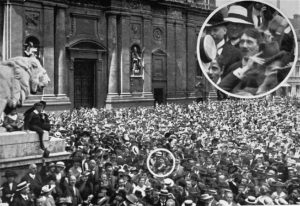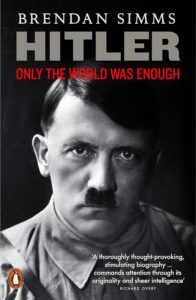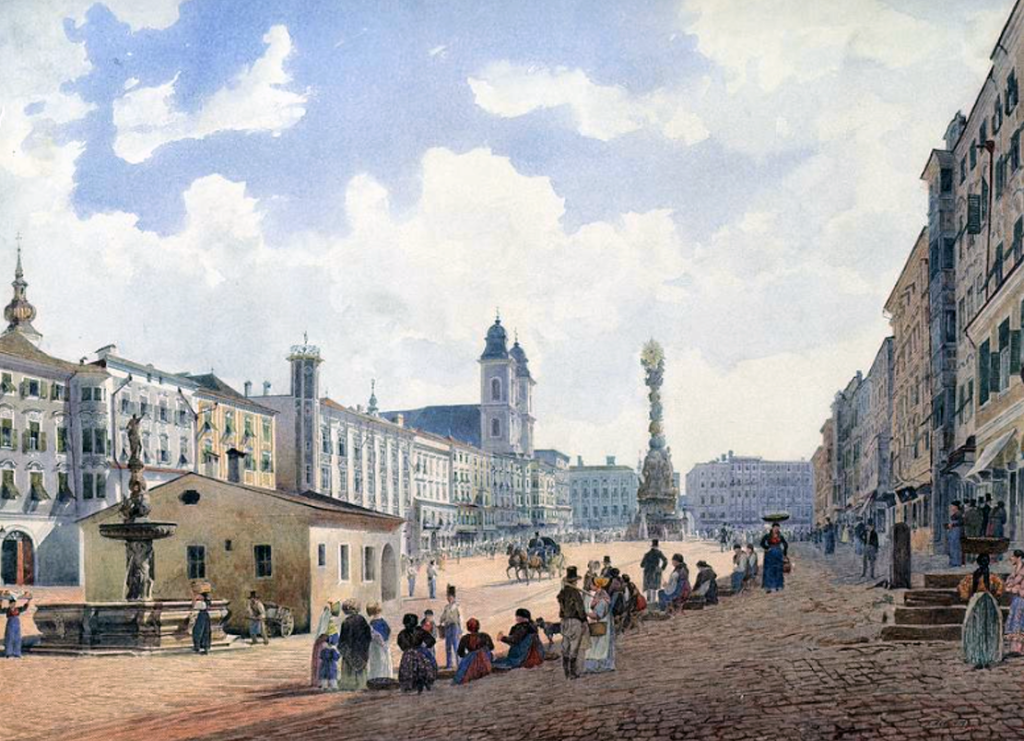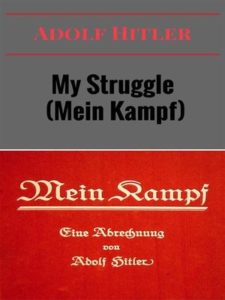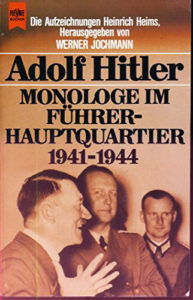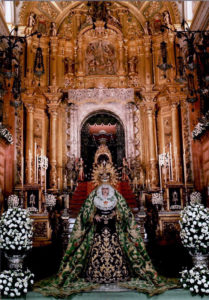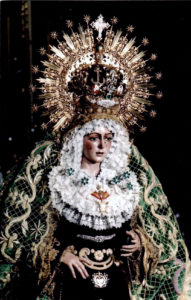and the Laws of Nature

by Martin Kerr
“…It is Life alone that all things must serve.”
—Adolf Hitler, Mein Kampf, Vol. I, Chap. 9, p. 215 (Manheim)
INTRODUCTION
A unique and compelling feature of the National Socialist worldview of Adolf Hitler is that, of all the various political movements and ideologies of the modern era, it alone is based solely on the Natural Order. Only National Socialism is grounded in reality, and not in phantasms of human mind.
National Socialists believe that the universe is governed by natural laws, and that for Man to be happy and successful, he must first acknowledge that these laws exist; secondly, he must discover what they are; and thirdly, he must live in accordance with them. This is another way of saying that the universe runs according to the principles of Causality—that is, of cause-and-effect relationships—and that it does not operate on the basis of supernatural forces, or on the mental constructions and wishful thinking of intellectuals and ideologues, or on the religious fantasies of theologians.
Hitler made this clear from the beginning of his career in public life. Writing in his book Mein Kampf in 1924, he stated:
When Man attempts to rebel against the iron logic of Nature, he comes into struggle with the principles to which he himself owes his existence as a man. And so his action against Nature must lead to his own doom… Here we encounter the objection [that] ‘Man’s role is to overcome Nature!’… But Man has never yet conquered Nature in anything, but at most has caught hold of and tried to lift one corner or another of her immense gigantic veil of eternal riddles and secrets, that in reality he invents nothing but only discovers everything, that he does not dominate Nature, but has only risen on the basis of his knowledge of various laws and secrets to be lord over those other living creatures who lack this knowledge… (Vol. I, Chap. 11, Manheim trans., p. 287)
And elsewhere:
Man must never fall into the madness of believing that he has risen to be lord and master over Nature—which is so easily induced by the conceit of half-education—but must understand the fundamental necessity of Nature’s rule, and realize how much of his existence is subject to these laws of combat and upward struggle. Then he will sense that in a universe where planets revolve around suns, and moons turn around planets, where force alone forever masters weakness, compelling it to be its obedient servant or else crushing it, there can be no special laws for Man. For him, too, the eternal principles of this ultimate wisdom hold sway. He can try to grasp them, but escape them never. (pp. 244-245)
The goal of National Socialism, then, is to consciously organize human society in accordance with the Natural Order. The postwar Danish National-Socialist Povl H. Riis-Knudsen thus defined National Socialism in a single sentence: “National Socialism is the application of the Laws of Nature to human affairs.”
The dominant thought-systems of today are uniformly based on the notion of human equality in one form or another: Multiracialism on racial equality; Marxism on economic equality; democracy on political equality; Christianity on spiritual equality. But when Adolf Hitler observed the world of living Nature, he saw that it was not equality, but rather inequality, that was ever-present. To be more precise, he saw that Nature operated according to the principles of structure and hierarchy.
There is structure and hierarchy both among the races of mankind, and also within the races. The hierarchy among the races he denoted as the Principle of Race, and that within each race as the Principle of Personality. He discusses this in depth in Volume II, Chapter 4, of Mein Kampf.
In a speech given in 1928, Hitler gave his own one-sentence definition of the National Socialist worldview: “All life is bound up in three theses: struggle is the father of all things, virtue lies in the blood, and leadership is primary and decisive.” Here “blood” symbolizes the Principal of Race and “leadership” the Principle of Personality. “Struggle” is the mechanism by which position in the hierarchy is determined.
The belief that life should be lived in harmony with the Natural Order permeated the whole of Hitler’s Germany, from the top to the bottom. It manifested itself not just in the political structure of the National Socialist state, but in every facet of society, including child-rearing, nutrition, forestry, animal rights, medicine and healthcare. The protection of the environment was a top priority. Truly, National Socialism was the original “green” movement!
The SS had a popular motto: “Know the laws of life and live accordingly.” Another SS saying pointed to the spiritual dimensions of the National-Socialist worldview: “The Divine manifests itself in the order of Nature, not in supernatural miracles.”
The scientific community enthusiastically supported the restructuring of society in harmony with the Natural Order. One example of this was botanist Ernst Lehmann, who characterized National- Socialism as “politically applied biology.” In 1934, only one year into the NS era, he wrote:
We recognize that separating humanity from Nature, from the whole of life, leads to mankind’s own destruction and the death of nations. Only through a reintegration of humanity into the whole of Nature can our folk be made stronger. That is the fundamental point of the biological tasks of our age. Mankind alone is no longer the focus of thought, but rather life as a whole… This striving with connectedness, with the totality of life, with Nature itself, a Nature into which we are born, this is the deepest meaning and the true essence of National-Socialist thought. (Biological Will: Means and Goals of Biological Work in the New Reich, pp. 10-11)
It is easy for the unsuspecting or the misinformed to fall victim to the vicious, lying, Hitler-bashing, anti-NS propaganda that is everywhere today. Attempts to discuss the profound and life-giving character of Adolf Hitler’s National Socialism often get sidetracked and bogged down in ridiculous and ill-informed debates concerning the conduct of German military operations during the Second World War—as though that subject were more important than our survival as a race!
But one person saw clearly through the miasma of anti-Hitlerism even when it was at its height. The National Socialist philosopher Savitri Devi recognized the magnitude of Adolf Hitler’s achievements, and of the unique value of his teachings—not just to the Aryan race, but to all mankind. In her magnum opus The Lightning and the Sun (1958) she wrote:
In its essence, the National Socialist idea exceeds not only Germany and our time, but the Aryan race and mankind itself and any epoch; it ultimately expresses that mysterious and unfailing wisdom according to which Nature lives and creates: the impersonal wisdom of the primeval forests and of the ocean depths and of the spheres in the dark fields of space; and it is to Adolf Hitler’s glory not merely to have gone back to that divine wisdom … but to have made it the basis of a practical regeneration policy of worldwide scope … (The Lightning and the Sun, pp. 219-220, standard edition; p. 128, Pierce edition)
We live in a civilization and in a society that is about as divorced from the Natural Order as possible. That is why the our race is sick. That is why the our race is dying. Only by once again living in harmony with the Laws of Nature can we regain our racial health. There is only one movement which offers this salvation, and hence there is only one path to racial survival, that of Adolf Hitler and National Socialism.
A SOCIOBIOLOGICAL PERSPECTIVE
Sociobiologists divide the animal world into three broad categories, based on whether or not they live in societies, and if they do, their degree of socialization. Animals which live in societies live in groups characterized by (1) hierarchy, and (2) cooperation. The three categories are:
1. Asocial animals, which either live solitary lives as individuals or else they live in groups without hierarchy or cooperation. Most felines (except for the lion) and orangutans are examples of animals who live as individuals. Schools of fish, flocks of birds and Thompson’s gazelle are animals who live in groups that are unstructured and the members of which do not cooperate with each other—basically they are collections of individuals.
2. Eusocial animals (essentially, bees, ants and their relatives) live in communities in which the individual does not exist for practical purposes—only the collective exists.
3. Social animals live in groups known as societies, in which there is hierarchy and cooperation. The individual has rights, but the rights generally are subordinate to the welfare of the society. Most higher primates, including all of the great apes except for the orangutan, and most canines, are social animals. Human beings are social animals. We are not bees (for whom only the collective exists) and we are not tigers (for whom only the individual exists).
In human society, the individual has rights, but these must be balanced against the overall welfare of the group. There is inevitably some tension between the group and the individual, but in successful societies this it is managed so that neither suffers unduly.
National Socialist Germany is the modern society that has done this the best. As a social state, it stands in balanced mid-point between the hive-like, eusocial collectivism of communism (in which the individual exists only to serve the state, and who has no rights at all), and the rootless, naked egoism of asocial libertarianism (in which the good of the whole is subordinate to the desires and whims of the individual).
This balance between the desires of the individual and the good of the racial community is exemplified in the Hitlerian dictum, “The right to personal freedom recedes before the duty to preserve the race.” (Mein Kampf, p. 255). This statement explicitly recognizes that there is a right to personal freedom, but that this right is subordinate to the common racial good.
The word “natural” is only problematic if someone is determined to see it as so. The opposite is “artificial.” The wolf is a canine that is the product of natural selection. The Chihuahua is a canine that is product of artificial selection. The society we live in today is an artificial society that is divorced from Nature. To be healthy as a race, we need a society that is structured in accordance with the world of Nature.
THEORY AND PRACTICE
Writing in 1980, the brilliant Australian National Socialist Dr. E.R. Cawthron, B.Sc. (Hons), noted that, “Just to speak in general terms about the laws of Nature serves little purpose.” Very true! Let us take a look at a specific natural law and its concrete application in National Socialist Germany.
In the above Introduction, it was noted that Adolf Hitler recognized that inequality, not equality, was the norm in living Nature, and that with regard to Man, this inequality manifested itself both between the races, and within each race. As a corollary to the law of racial inequality, Hitler also discerned a law concerning “the urge toward racial purity.” He wrote:
[M]en without exception wander about in the garden of Nature; they imagine that they know practically everything and yet with few exceptions pass blindly by one of the most patent principles of Nature’s rule: the inner segregation of the species of all living beings on this earth…Every animal mates only with an animal of the same species… Only unusual circumstances can change this… (p.284)
He further noted:
The result of all racial crossing is therefore in brief always the… lowering of the level of the higher race. (p.286)
And he offered an example:
Historical experience shows countless proofs of this. It shows with terrifying clarity that in every mingling of Aryan blood with that of lower peoples the result was the end of the cultured people. North America, whose population consists in by far the largest part of Germanic elements who mixed but little with the lower colored peoples, shows a different humanity and culture from Central and South America, where the predominantly Latin immigrants often mixed with the aborigines on a large scale. By this one example, we clearly and distinctly recognize the effect of racial mixture. The Germanic inhabitant of the American continent, who has remained racially pure and unmixed, rose to be the master of the continent; he will remain the master as long as he does not fall victim to defilement of the blood. (p. 286)
Thus we can see the development of Hitler’s logic with regard to natural law in this instance:
• He begins by postulating a law or principle that holds true for all of living Nature.
• He further shows how Man is specifically included in this law’s
• Taking the discussion out of the realm of theory, he gives a concrete example of the expression of this law in the real world.
But it does not stop there. On September 15, 1935, Adolf Hitler, as chancellor of the German Reich, signed a law into effect prohibiting race-mixing between “citizens of German or related blood” and Jews. This act was formally titled the “Law for the Protection of German Blood and German Honor.”
Mainstream historians have termed this the “Nuremberg Race Law,” and claimed that it was the sinister first step toward the extermination of European Jewry. But it was nothing of the sort. Rather, it was a preliminary and far-sighted attempt to tentatively codify Natural Law as State Law. Adolf Hitler had begun to restructure German society so as to bring it in accordance with Nature—just as he had advocated a decade earlier in Mein Kampf.
LINCOLN ROCKWELL’S ‘LAWS OF THE TRIBE’
George Lincoln Rockwell is the founder of postwar American National Socialism, and one of the foremost disciples of Adolf Hitler’s thought of all time. He is remembered primarily as a man of action, which is unsurprising given the dramatic and dynamic course of his life. Yet he was also a man of towering intellect. In addition to numerous essays and articles, he authored two books, This Time the World (1962), his political autobiography, and White Power, which was published posthumously in 1968.
Like Adolf Hitler, Lincoln Rockwell recognized that Man was a part of the Natural Order, and that he was in no meaningful way separate or distinct from it. In Chapter 15 of White Power, entitled “National Socialism,” he lists five “Laws of the Tribe” that govern the social organization of all social animals (see Part Two). They are true for wolves as well as for elephants, for dolphins as well as for chimpanzees—and for Man as well. In a human context, by “Tribe” Rockwell means Race or folk or ethnicity.
Here are Rockwell’s Five “Laws of the Tribe”:
1, The Law of Biological Integrity;
2. The Law of Territory;
3. The Law of Leadership;
4. The Law of Status; and
5. The Law of Motherhood or Family
In White Power, he discusses four of the five principles or laws in some depth. By Biological Integrity, Rockwell means both the instinctive urge to protect the exclusive gene-pool of the tribe, but also the love-hate dichotomy that this generates. He writes:
The two instincts are equally important. Love is not “good” while hate is “evil” — which is the canard so dearly loved by the Jews, liberals, hippies, queers, and half- wits…
Love, the natural healthy kind, is indeed what makes the world go round, and it is the most beautiful, holy miracle we ever see here on earth.
But without a deadly hate of that which threatens what we love, Love is an empty catchword for hippies, queers, and cowards…
Biological Integrity: absolute, total and uncompromising loyalty to one’s own racial group based on a consuming love, and absolute, uncompromising hatred of any outsiders who intrude and threaten to mix their genes with those of the females of the group. (pp. 445-446)
By “Territory” he means in the first instance the land or real estate that the tribe lives on. In National Socialist Germany, the close relationship between Biological Integrity and Territory was encapsulate in the phrase “Blood and Soil” (Blut und Boden). But he also expands this to include the principle of private property. Here Rockwell draws a fundamental dividing line between National Socialism and Jewish, Marxist socialism.
Rockwell specifies “Leadership by the best.” By the best, not by the most popular, nor by the wealthiest, and certainly not by those most eager to kiss Jewish posterior.
“Status” he defines as the natural place or rank of each individual within the tribe. Everyone in the tribe is not “equal” to everyone else—but each person has worth and value, and a role to play in society.
Rockwell does not mention Motherhood and Family, beyond including it in his list of Five Laws. He was writing in the mid-1960s, when everyone in White society still had a healthy appreciation of the traditional family. He apparently thought that it was unnecessary to describe it further. Perversions such as homosexual “marriage” were so far over the social horizon that they were not even visible in 1967. One can only imagine what he would have to say about such manifestations of racial decadence and social decline. The traditional family always has been, remains, and always will be the basic social building block of every healthy White society.
Rockwell was not a trained anthropologist, and in listing the Five Laws, he was deeply indebted to Robert Ardrey, author of books on this subject such as African Genesis and The Territorial Imperative. But although it was outside the field of his formal knowledge, Rockwell was intelligent enough to recognize the truth when he saw it, and to portray it from a National Socialist perspective.
When he first read African Genesis, Rockwell was so taken with Ardrey’s ideas that he wrote the author a multipage letter explaining that National Socialism was nothing less than the political embodiment of Ardrey’s central thesis. When several months passed and the author did not respond to his communication, Rockwell sent him a registered letter asking if he had received his first letter. Again, Ardrey did not reply.
However, Ardrey went on to write another book, The Territorial Imperative, in which he discussed his Law of Territory in detail. In this book, Ardrey takes pains to explicitly distance himself from National Socialism. He does not mention Rockwell by name, nor does Ardrey address Rockwell’s contention that National Socialism is the political embodiment of his ideas—he just wants his readers to know that he was not one of those awful “Nazis.”
Nonetheless, both African Genesis and The Territorial Imperative are great books, and their content is completely NS in their exposition. We recommend both, despite the superficial anti-NS orientation of the second volume.
These Five Laws enunciated in White Power will someday form the basis for the National Socialist New Order which we, the heirs of Hitler and Rockwell, will build in North America.
CONCLUSION
The question that White people must ask themselves is this: Does human existence rest on a biological foundation or not? If it does, then the biological prerequisites that form the basis of our existence must be respected or a great price for ignoring them must be paid.
The wages of racial sin is racial death.
The situation today, in which the Aryan peoples of the world—without exception—live in societies completely divorced from the Natural Order must be viewed from a great historical perspective as a temporary dislocation. It is a sickness, not a permanent condition, and the patient will either recover or die.
National Socialism is the reorientation of human society to once again bring it in accordance with Nature and her iron laws. It is the cure for the disease.
NATIONAL SOCIALISM AND THE NATURAL ORDER: A SELECT READING LIST
What I have written here is only an introduction to the topic of National Socialism and the Natural Order. To really grasp it thoroughly and in depth, it needs to be studied. Here are a few texts to get you started on your exploration.
Basic National Socialist texts
- Mein Kampf by Adolf Hitler. Verlag Franz Eher Nachfolger, GmbH, Muenchen, Band I 1925, Band II 1927, 781 pp., index.
- Mein Kampf by Adolf Hitler, trans. Ralph Manheim. Houghton Mifflin Company, 1943. Index, 694 pp., ISBN-13: 978-0395925034. Reading it the original is always the preferred option, but if you are limited to an English translation, this one is the best.
- White Power by George Lincoln Rockwell. Ragnarok Press, Dallas, Texas, 1967 [1968]. Illustrated, 482 pp. See especially Chapter 15, “National Socialism,” for Rockwell’s discussion of the Natural Order and National Socialism.
- National Socialism: The Biological Worldview by Povl H. Riis-Knudsen. Nordland Forlag, Aalborg, 1987. Frontispiece, 30 pp. Essential.
Books hostile to National-Socialism but still containing valuable information
- Blood and Soil: Walther Darré and Hitler’s Green Party. Kensal Press, 1985, 224 pp., ISBN-13: 978-0946041336. Not pro-NS by any stretch of the imagination, but much less hostile than most mainstream books on Hitler and the Hitler era.
- Racial Hygiene: Medicine under the Nazis by Robert N. Proctor. Harvard University Press, Cambridge, Mass., and London, England, 1988. Notes, index, bibliography, 43 figures, 414 + vii pp., ISBN 0-674-74580-9. See especially Chapter 1, “The Origins of Racial Hygiene,” and Chapter 3, “Political Biology: Doctors in the Nazi Cause.” Proctor goes out of his way to show that he is anti-NS, perhaps because the subject he investigates are so inherently pro-NS.
- The Nazi War on Cancer by Robert N. Proctor. Princeton University Press, Princeton and Oxford, 1999. Notes, index, bibliography, figures, 380 + x pp., ISBN 0-691-00196-0. See especially Chapter 3, “Genetic and Racial Theories,” Chapter 5, “The Nazi Diet,” and Chapter 6, “The Campaign against Tobacco.” Even more hostile than Racial Hygiene — but containing even more good information.
- Ecofascism: Lessons from the German Experience by Janet Biel and Peter Staundenmaier. AK Press, San Francisco and Edinburgh, 1995. Footnotes, 73 pp., ISBN 1-873176-73-2. Consists of two essays: “Fascist Ideology: the ‘Green Wing’ of the Nazi Party and Its Antecedents” by Staudnemaier; and “‘Ecology’ and the Modernization of Fascism in the German Ultra-Right” by Biehl.
Anthropology and sociobiology
None of the books listed below is written by a National-Socialist or with an NS or WN audience in mind, but they all show the biological underpinnings of the National Socialist worldview and NS policies.
- Introduction to Anthropology by Dr. Roger Pearson. Harcourt College Publishers, 1974. Approx. 500 photographs, charts, and maps; glossary; table of languages; index, 616 pp., ISBN-13: 978- 0030915-17-8.
- Sociobiology: The Abridged Edition by Edward O. Wilson. Harvard University Press, Cambridge, Mass., and London, England, 1980. Bibliography, glossary, index, 366 + ix pp., ISBN 0-674-81623-4. There is a longer version, Sociobiology: The New Synthesis, written for scholars, but we recommend the abridged edition for non-specialist readers.
- Promethean Fire: Reflections on the Origin of the Mind. Charles J. Lumsden & Edward O. Wilson, Harvard University Press, Cambridge, Mass., and London England. Endnotes, index, 216 pp., ISBN 0-674-71445-8.
- African Genesis: A Personal Investigation into the Animal Origins and Nature of Man by Robert Ardrey, Atheneum Publishers, NY, 1961. Paperback edition, 384 pp., index, ISBN 0-553- 10215-X.
- The Territorial Imperative: A Personal Investigation into the Animal Origins of Property and Nations by Robert Ardrey, Atheneum Publishers, NY, 1966. Bibliography and bibliographical key, 355 pp.
- The Naked Ape: A Zoologist’s Study of the Human Animal by Desmond Morris. ISBN 0- 070431-74-4, 1967. Says Wikipedia: “[Z]oologist and anthropologist Desmond Morris… looks at humans as a species and compares them to other animals. The Human Zoo, a follow-up book by Desmond Morris, which examined the behavior of people in the cities, was published in 1969.”
- Race by John R. Baker. Oxford University Press, London, 1981, ISBN 0-936396-01-6. 625 pp., 13 appendices, 82 illustrations, bibliography. A comprehensive, exhaustive examination of the biological reality of race and racial differences. Suitable both for specialist and general readership.
